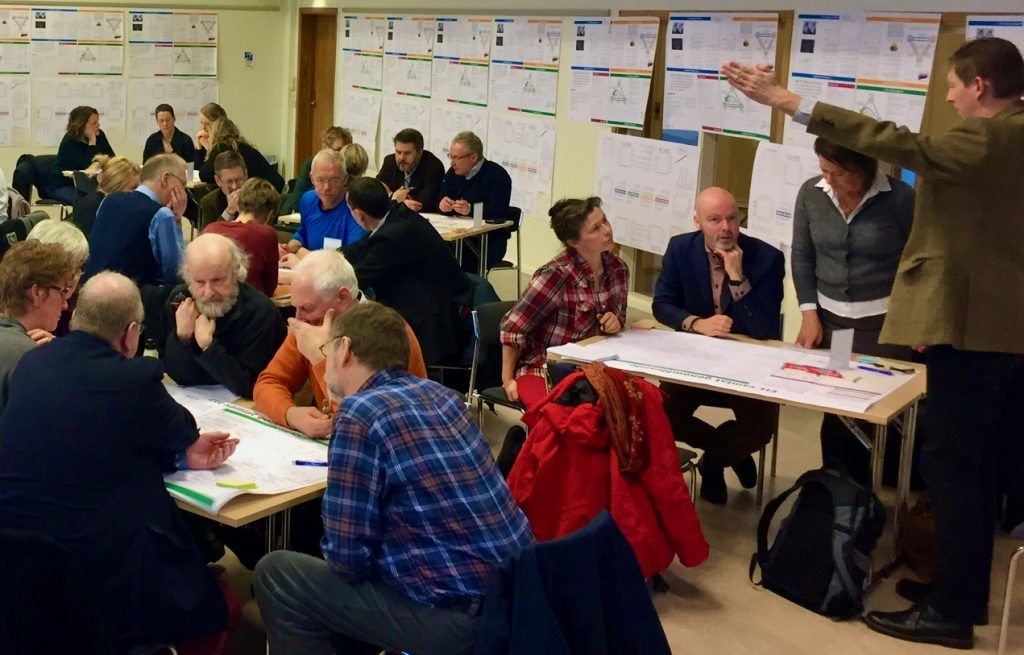WHO IS THIS FOR?
This training is for those who hold space for dialogue and facilitate conversations as part of their professional practice — and who now want to deepen their capacity to guide meaningful, transformative meetings.
Whether you’re a manager, process leader, coach, consultant (internal or external), educator, supervisor, therapist — or someone who aspires to grow into such a role — this course offers a strong foundation for leading learning, change, and renewal through skillful dialogue.
You may be working within an organization, guiding systemic change across sectors, or preparing for a future in which the ability to think and learn together is a vital leadership skill. Wherever you are, this course invites you into a deeper practice of transformative facilitation, grounded in the art and science of human connection.

THE PURPOSE: TRANSFORMATIVE FACILITATION
The core purpose of the training is to build the capacity to host, guide and deepen dialogue — especially in contexts where complexity, diversity, or uncertainty are present.
You’ll develop the ability to navigate and co-create meaning in high-stakes conversations. Drawing on insights from systems thinking, adult development, dialogue theory, and neuroscience, we blend practical tools with personal exploration to grow both skill and presence.
The course offers you:
- A deeper understanding of how to create psychological safety and constructive tension
- Tools for tapping into collective intelligence and inner knowing
- Language and frameworks for reading group dynamics and cultural patterns
- Practical strategies for facilitating digital, hybrid, and in-person conversations
- A stronger felt sense of authenticity, attunement, and ethical clarity
WHAT YOU WILL LEARN
By the end of the course, you will have:
- Expanded your capacity to hold space for diversity, disagreement, and complexity
- Developed tools for activating energy, insight, and co-ownership
- Strengthened group decision-making and problem-solving
- Learned how to support teams in moving from words to action
- Deepened your understanding of the neurobiology of dialogue — what opens us, and what shuts us down
- Established a shared vocabulary and framework for essential conversations
- Gained practical experience in reading group moods, roles, and hidden dynamics
- Cultivated the presence and mindset needed to build a dialogic culture

COURSE CONTENT – EXAMPLES OF PRACTICE AND THEORY
We work through a blend of theory, experiential learning, and reflective practice. The training is held in both physical and digital formats, allowing us to explore how dialogue shifts across different spaces. Sample tools and sessions include:
- The Skill Mirror – surfacing personal patterns and potentials
- The Art of the Good Conversation – core conditions for transformative dialogue
- The Four Skills of Dialogue – listening, voicing, respecting, suspending
- Reading the Room – sensing the tone, tempo, and tension
- Culture Mapping – strengths and blind spots in group cultures
- The Three Languages of Dialogue – facts, feelings, and meaning
- Inference Ladders and Advocacy/Inquiry Tools – sharpening awareness of assumptions
- Trust & Trust Capsules – building containers for deeper contact
- Visioning Dialogues – practicing futures thinking through conversation
Each module integrates a systems and neuroscience lens, helping participants understand what enables or blocks collective intelligence in real time.
COURSE STRUCTURE & PRACTICALITIES
Format: The program is delivered in modules, alternating between in-person gatherings and guided online sessions.
Location & Dates: Provided upon registration or inquiry.
Price: Fees are set per participant and depend on group size and location. Literature and accommodation (where applicable) are added separately. Custom packages available for teams and organizations.
COURSE LEADER – GÖRAN GENNVI
Göran Gennvi brings over 30 years of experience as a senior advisor, educator, and guide in organizational transformation and regenerative leadership. His work integrates dialogue practice, adult development theory, and nature-based leadership.
He has trained with pioneers like William Isaacs, Peter Senge, and Otto Scharmer, and draws inspiration from Gestalt pedagogy, Dzogchen awareness, and systems sensing. Göran has taught at the Stockholm School of Economics Executive Education (IFL), worked with The Natural Step and the Board Academy, and served as a Senior Advisor at the Tällberg Foundation.
He founded the Nature Academy Learning Lab, co-creator of GetWiLD, and a long-time practitioner of dialogic organizational learning through the Society for Organizational Learning (SoL).


